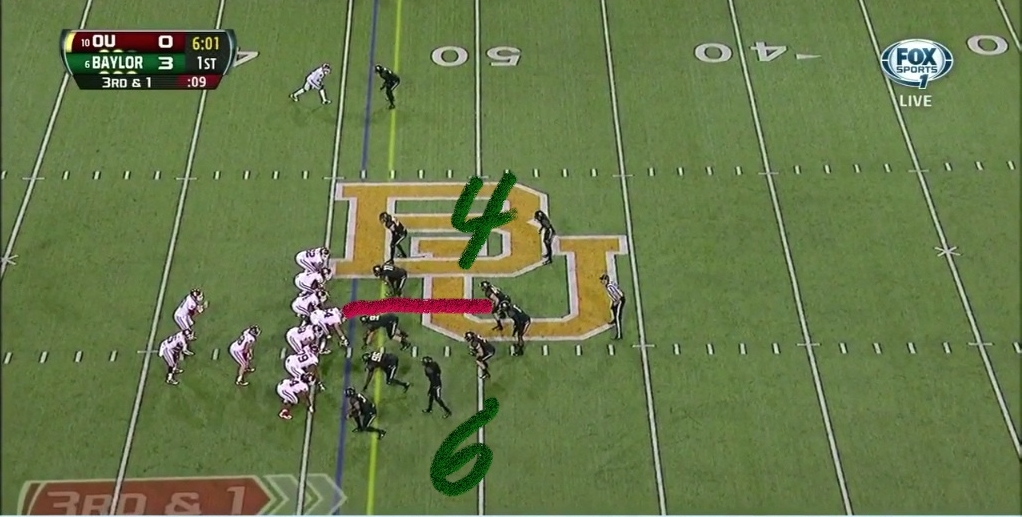 It’s Simple Math – The Run Game Problem I Just Can’t Accept
Posted on: November 11, 2013
It’s Simple Math – The Run Game Problem I Just Can’t Accept
Posted on: November 11, 2013
Image from Sesame Workship (Sesame Street)
I’ve been an Oklahoma fan as long as I can remember. I grew up in a little town called Bearden, which lies between 72 and 78 miles almost due east of Norman depending on which route you take. To a small town kid the kids from bigger towns were cooler, “going to town” was an event and those guys I saw on Saturday afternoons wearing those shiny red helmets were like the gods of Greek mythology. Besides the names I learned in Sunday school, names that were equally as full of wonder to a eight year old kid, I learned the names of players like Casillas, Holieway, Aikman, Jackson, Tillman, Reed, Dixon, and Bosworth. I remember begging my mom for a Sports Illustrated subscription so I could get more information on those guys in the red helmets. Right about the time that I became aware of what was going on just south of Oklahoma City, it was 1984. Any Sooner fan who remembers the mid to late eighties remembers the powerhouse teams we had back then. What those guys were able to do caused me to fall in love with the University of Oklahoma. My University. Our University. Even through the lean years of the nineties, I still held Oklahoma in high regard. More than high regard…reverence. If you want to be a great doctor you go to Johns Hopkins. If you want to be a great lawyer you go to Harvard or Yale. If you want to be a great military leader, you go to West Point. If you want to be considered a great player, you go to Oklahoma. It’s where the best of the best play. It’s where the best coaches coach.
I first started playing college ball in the fall of 1995, it only took me a semester to learn more about the game of football than I had learned in the previous eighteen years. My position coach on the offensive line was Dan Scheible. Sgt. Scheible, as we came to call him, had a way about him to make you respect him, fear him and love him all at the same time. Coach Scheible had a way about him that made you want to play hard for him. He was a guy’s guy. If you were a starter for Coach Scheible, you were a tough guy. You had to prove to him that you were going to do what you were supposed to do, be where you were supposed to be and do them both as hard and as fast as you could. He was a great teacher. I learned as a freshman in college that running the football is as much about outnumbering people at the point of attack as it is about being physical. He was a student of the game, and he made us better, because he taught us. Anyone who played for him and broke down film with him can see the things that I see when I watch the game now. Back then, the option offenses of Nebraska and Kansas State were in high gear. There weren’t a lot of schools out there slinging the pill around the yard, and if you were going to win football games, you had to be tougher, more physical and smarter than the other guy.
Approximately 2,500 years ago Sun Tzu wrote that “Strategy without tactics is the slowest route to victory. Tactics without strategy is the noise before defeat.” When I observe this offensive team we have lining up on Saturdays, it is clear to me that we are not strategists, and we are definitely not tacticians. We had no plan last Thursday night, and we definitely did not maneuver our troops effectively. It’s hard for me to watch a game like the one we saw in Waco. Offensive linemen, former or present, are emotional beings. We tend to be among the smartest people on the team most of the time as well. That just makes it harder for us fat guys to see what’s happening and not get pissed off about it. I get pissed off about it because I understand it. I get ticked off because the school I love the most in this world does things that would indicate to anyone with an understanding of the game we don’t understand basic things. We aren’t devising sounds strategies or employing sound tactics.
At the University of Oklahoma, you expect your players to be bigger, faster and stronger than everybody else. You expect your players to be better players because of those physical attributes, but you expect our team to be better because you expect them to be better educated about how to play the game. More importantly how to win the game.
During my time in playing in college we could run the ball on anybody. I don’t remember a time in my four years that we got stuffed on the goal line. Don’t get me wrong, we lost some games, but we could run the ball on anybody. We could run the football number one because our coaches put us in position to run it. We could run the football, number two because by God you weren’t going to stop us!
What makes this offensive ineptitude in the run game harder to swallow is that we get the offensive play calls from the sideline. One of the benefits we’ve been sold for the past few years regarding the no huddle is that you can get the defense to show their hand and then once they line up, get a better call and catch them at a disadvantage. Sounds good right? Problem is, inn the run game I rarely see us do it. We fail to adapt. And whatever the reason is, it’s not acceptable. Watching Bama/LSU Saturday night, I was watching a savant call a game running the ball. So many times I watched Bama run the football to the side that they had more players than LSU by formation, and they gashed them. Bama took the advantages presented to them. While Bama doesn’t need much help, their coaches put them in position to be dominant.
In the picture below you can see that to our offensive right, Baylor had six players, and to the offensive left, there are only four. The NG is shaded to Ikard’s right. You would think that since the coaches in the booth are signaling in plays and audibles, they would be able to see that there is less resistance to the left than there is by running to the right. What speaks volumes about the level of ability of our players is the fact that the only player we left unblocked in running this play was Dixon, their free safety. Very few running schemes account for the free safety in blocking. The only mistake we made on this play was that Bronson didn’t stay square to the line of scrimmage off of his combo. Every other player of the six we had blocking made their blocks. So Stoops is right when he’s talking about execution, but going back to tactics, it’s much easier to block four players than it is six. There is less chance of a mistake when you’re asking four guys to do things right instead of six. Anytime you have more moving parts there are more opportunities to fail. This is football 101.



8 Comments
Love the detail you guys give. Thanks. One question. It seems to me this is strictly a play calling issue. I’m ignorant to college level blocking schemes, so do you see any issues with our schemes? I would think not as the play you outlined got everyone blocked, just not running the correct play for the presented defense. Just curious if Bedenbaugh is as good as he seems to me and Heupel carries most of the blame.
In my opinion, Coach B has done wonders with our o line already. Give him time to recreate that culture, and there will be no question. To a degree as an olineman and an oline coach, there’s a tendency to be a good soldier and do what you’re told. B’s only been here less than a year. He got the training methods changed. Give him time, and I believe we’ll adjust.
Why not call a packaged play there? We have Saunders(?) one-on-one with the CB. The safety is unlikely to get over in time to help on a quick pass.
OU regularly telegraphed their intentions and, seemingly, wanted to play man-ball, assuming they could just line up and execute and it would work (this is what we’re told every week). If simply executing the play is the key, then there is much less need for a play caller. Of course, we know that this is not the case.
Love the creative thought there, and this goes hand in hand with what I’ve been chirping about for a few weeks. Look at all that space that you have if you go play action and a short post to Saunders. No way he’s getting covered one on one. Fake that run play up in there and it’s a big play. I’m with you man!
I like the thought too. It seems to me that Heupel doesn’t trust any of the QBs to make reads too often. Especially after it came out that the INT Knight threw in the end zone early in the season was a run/pass option and he decided incorrectly. There is a complete lack of creativity on offense this season. And I’m not talking about trick plays. I’ve heard multiple comments like “my wife knows nothing about football and can predict the play.” Its been a pretty rare occurrence this year that OU fools me after they line up. I don’t care how good your athletes are, at the D1 level, if you lack creativity you are going nowhere. Couple that with a lack of common sense in play calling and you get what we’ve seen for a couple of months.
Yes…yes…and um…yes
How much latitude are other college QBs given to audible? I keep reading that there is general issue with the lack of time JH spends coaching the QBs, is this root cause?
Couldn’t speak to how much time he spends, but I do know that quite often in college we would go to the line with a call like “two play trap check” or “two play stretch check” “two play counter check” etc. Once we got to the line our qb would survey the front, and make the call to the side where we had the advantage. This was almost 20 years ago too. If he didn’t see an advantage either way, we had another play we could change to and he’d “kill” the trap check etc to go to a better play. Something a lot of us have noticed is that our QB’s don’t have time to survey the d since they’re always looking to the sideline before the play. Also, instead of looking over the d from under center, they’re focusing on fielding the snap from the gun. So they have a limited amount of time to actually see what’s in front of them before the snap.